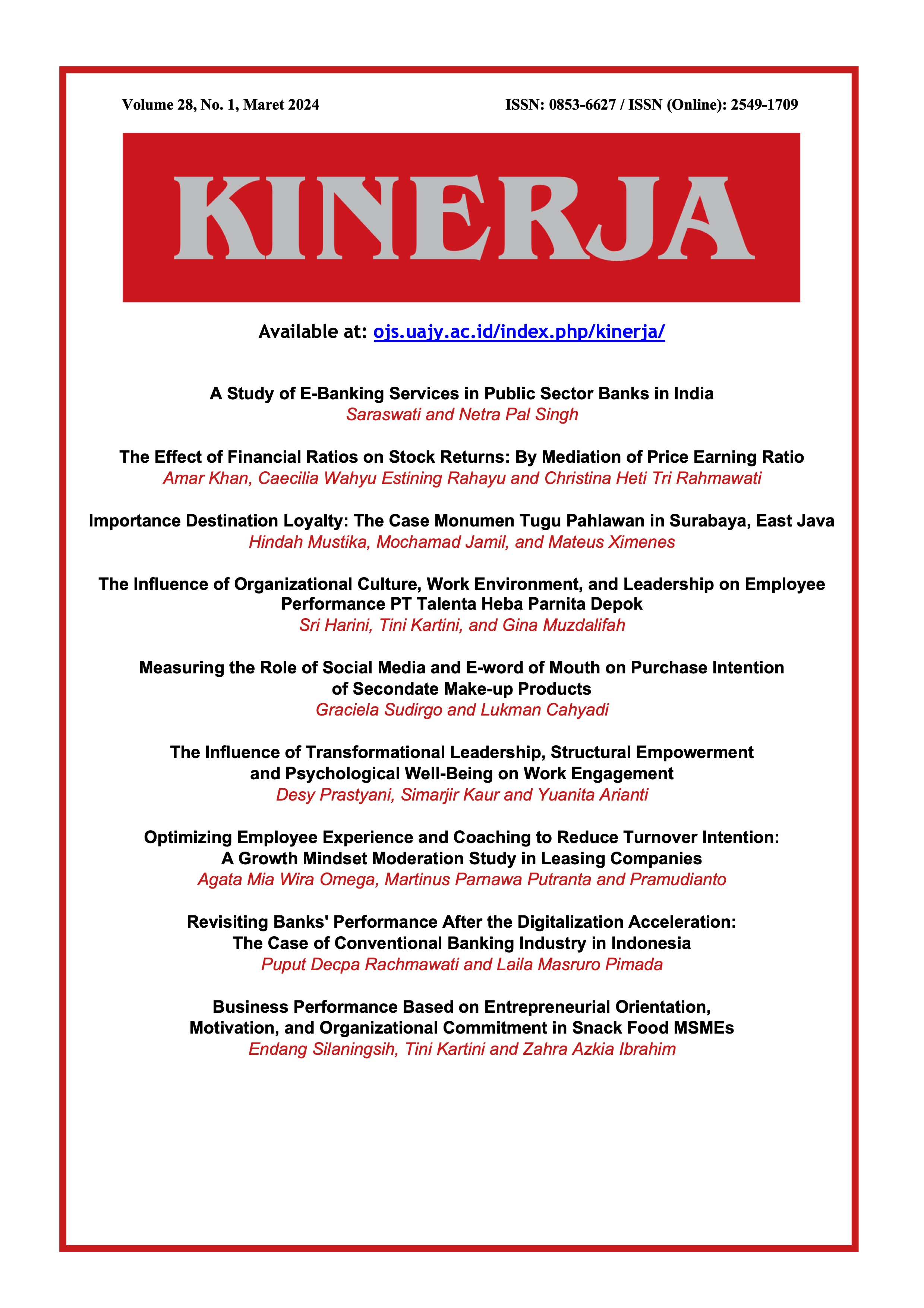The Influence of Transformational Leadership, Structural Empowerment and Psychological Well-Being on Work Engagement
DOI:
https://doi.org/10.24002/kinerja.v28i1.8098Keywords:
psychological wellbeing, structural empowerment, transformational leadership, work engagementAbstract
A leader with the right leadership style who performs his duties effectively and efficiently is essential to increase the quality and efficiency of the organization. Transformational leadership motivates followers to perform beyond expectations by awakening followers' higher needs. Transformational leadership plays an important role in creating structural empowerement that can lead to positive organizational outcomes. Structural empowerment is expected to increase the psychological well-being of employees. Work engagement can be shaped by enabling factors such as transformational leadership, structural empowerment and psychological well-being that help create readiness for change. This research therefore aims to examine how transformational leadership can shape work engagement through structural empowerment and psychological well-being.
This research is a quantitative study that used a purposive sampling method and included 190 hospital workers in Jakarta, Bogor, Depok, Tangerang, and Bekasi. Data were analyzed using SEM-PLS 3.0 structural equation modeling. The results show that transformational leadership influences work engagement, structural empowerment and psychological well-being. According to the results, employee engagement can be improved by implementing transformational leadership, structural empowerment and psychological well-being in the workplace. The interdependence of these factors creates a productive and positive work environment.
References
Ariyani, N. and Hidayati, S., 2018. Influence of transformational leadership and work engagement on innovative behavior. Etikonomi, 17(2), pp.275-284.
Asif, M., Jameel, A., Hussain, A., Hwang, J. and Sahito, N., 2019. Linking transformational leadership with nurse-assessed adverse patient outcomes and the quality of care: assessing the role of job satisfaction and structural empowerment. International Journal of Environmental Research and Public Health, 16(13), p.2381.
Asnawi, M.A.M., 2020. Pengaruh komunikasi, standar kerja, pemberdayaan terhadap kepuasan kerja untuk meningkatkan kinerja karyawan. Warta Dharmawangsa, 14(2).
Avolio, B.J. and Bass, B.M., 1995. Individual consideration viewed at multiple levels of analysis: A multi-level framework for examining the diffusion of transformational leadership. The Leadership Quarterly, 6(2), pp.199-218.
Bass, B.M., 1999. Two decades of research and development in transformational leadership. European journal of work and organizational psychology, 8(1), pp.9-32.
Bass, B. M., and Avolio, B. J., 1990. Developing transformational leadership: 1992 and beyond bernard. Nurse Education Today, 14(5), pp.8–12.
Boamah, S. and Laschinger, H., 2015. Engaging new nurses: The role of psychological capital and workplace empowerment. Journal of Research in Nursing, 20(4), pp.265-277.
Bro, J.L., 2020. A global research trend on leadership in sport: A bibliometric analysis. International Journal of Psychosocial Rehabilitation, 24(5), pp.163-170.
Castro, C. B., Perinan, M. M. V., and Bueno, J. C. C., 2008. Transformational leadership and followers' attitudes: The mediating role of psychological empowerment. The International Journal of Human Resource Management, 19(10), pp.1842-1863.
Cummings, G.G., MacGregor, T., Davey, M., Lee, H., Wong, C.A., Lo, E., Muise, M. and Stafford, E., 2010. Leadership styles and outcome patterns for the nursing workforce and work environment: a systematic review. International journal of nursing studies, 47(3), pp.363-385.
Epitropaki, O. and Martin, R., 2005. From ideal to real: A longitudinal study of the role of implicit leadership theories on leader-member exchanges and employee outcomes. Journal of Applied Psychology, 90(4), p.659.
Fikri, H. and Prastyani, D., 2021. Gaya kepemimpinan transformasional masa pandemi COVID 19: Kinerja karyawan dimediasi oleh motivasi. Publika Jurnal Administrasi Publik, 10(2), pp.8-20.
García‐Sierra, R. and Fernández‐Castro, J., 2018. Relationships between leadership, structural empowerment, and engagement in nurses. Journal of advanced nursing, 74(12), pp.2809-2819.
Goedhart, N.S., van Oostveen, C.J. and Vermeulen, H., 2017. The effect of structural empowerment of nurses on quality outcomes in hospitals: A scoping review. Journal of Nursing Management, 25(3), pp.194-206.
Hair, J., Black, W. C., Babin, B. J., and Anderson, R. E., 2014. Multivariate Data Analysis: Pearson New International Edition. Essex: Pearson Education Limited.
Hair, J.F., Risher, J.J., Sarstedt, M. and Ringle, C.M., 2019. When to use and how to report the results of PLS-SEM. European Business Review, 31(1), pp.2-24.
Hair, J.F., Ringle, C.M. and Sarstedt, M., 2013. Partial least squares structural equation modeling: Rigorous applications, better results and higher acceptance. Long Range Planning, 46(1-2), pp.1-12.
Hair Jr, J.F., Matthews, L.M., Matthews, R.L. and Sarstedt, M., 2017. PLS-SEM or CB-SEM: updated guidelines on which method to use. International Journal of Multivariate Data Analysis, 1(2), pp.107-123.
Handoko, H., and Tjiptono, F., 2012. Kepemimpinan transformasional dan pemberdayaan. Journal of Indonesian Economy and Business, pp.23-33.
Hannah, S.T., Perez, A.L., Lester, P.B. and Quick, J.C., 2020. Bolstering workplace psychological well-being through transactional and transformational leadership. Journal of Leadership & Organizational Studies, 27(3), pp.222-240.
Harter, J.K., Schmidt, F.L. and Hayes, T.L., 2002. Business-unit-level relationship between employee satisfaction, employee engagement, and business outcomes: a meta-analysis. Journal of Applied Psychology, 87(2), p.268.
Helmi, A., Wardani, S.P.R. and Riyanto, B., 2019. Analysis of cost of road infrastructure maintenance caused by overweight goods transportation in primary arterial roads. International Journal of Civil Engineering and Technology, 10(2), pp.1526-1545.
Jufrizen, J., 2018. Efek moderasi etika kerja pada pengaruh kepemimpinan transformasional dan budaya organisasi terhadap kinerja karyawan. E-Mabis: Jurnal Ekonomi Manajemen Dan Bisnis, 18(2), pp.145-158.
Kahn, W.A., 1990. Psychological conditions of personal engagement and disengagement at work. Academy of Management Journal, 33(4), pp.692-724.
Kanter, R. M., 1977. Men and Women of the Corporation. New York: Basic Books.
Lai, F. Y., Tang, H. C., Lu, S. C., Lee, Y. C., and Lin, C. C., 2020. Transformational leadership and job performance: The mediating role of work engagement. SAGE Open, 10(1).
Lan, X.M. and Chong, W.Y., 2015. The mediating role of psychological empowerment between transformational leadership and employee work attitudes. Procedia-Social and Behavioral Sciences, 172, pp.184-191.
Laschinger, H.K.S., 2008. Effect of empowerment on professional practice environments, work satisfaction, and patient care quality: Further testing the nursing worklife model. Journal of nursing care quality, 23(4), pp.322-330.
Laschinger, H.K.S., Finegan, J., Shamian, J. and Wilk, P., 2001. Impact of structural and psychological empowerment on job strain in nursing work settings: Expanding Kanter’s model. JONA: The Journal of Nursing Administration, 31(5), pp.260-272.
Laschinger, H. K. S., Finegan, J., and Wilk, P., 2009. The impact of unit leadership and empowerment on nurses' organizational commitment. The Journal of Nursing Administration, 39(5), 17–22.
Leithwood, K. and Jantzi, D., 2006. Transformational school leadership for large-scale reform: Effects on students, teachers, and their classroom practices. School Effectiveness and School Improvement, 17(2), pp.201-227.
Mauno, S., Kinnunen, U. and Ruokolainen, M., 2007. Job demands and resources as antecedents of work engagement: A longitudinal study. Journal of Vocational Behavior, 70(1), pp.149-171.
Meria, L., Prastyani, D. and Dudhat, A., 2022. The role of transformational leadership and self-efficacy on readiness to change through work engagement. Aptisi Transactions on Technopreneurship (ATT), 4(1), pp.77-88.
Monje-Amor, A., Xanthopoulou, D., Calvo, N. and Vázquez, J.P.A., 2021. Structural empowerment, psychological empowerment, and work engagement: A cross-country study. European Management Journal, 39(6), pp.779-789.
Munir, F., Nielsen, K., Garde, A.H., Albertsen, K. and Carneiro, I.G., 2012. Mediating the effects of work–life conflict between transformational leadership and health‐care workers’ job satisfaction and psychological wellbeing. Journal of Nursing Management, 20(4), pp.512-521.
Niinihuhta, M., Terkamo‐Moisio, A., Kvist, T. and Häggman‐Laitila, A., 2022. Nurse leaders' work‐related well‐being—Relationships to a superior's transformational leadership style and structural empowerment. Journal of Nursing Management, 30(7), pp.2791-2800.
Nurhidayati, N. and Najmah, N., 2022. Performance Enhancement Strategy through Work Engagement: The Role of Transformational Leadership and Structural Empowerment. e-Academia Journal, 11(1), pp.81–90.
Nurmiyanti, L. and Candra, B.Y., 2019. Kepemimpinan transformasional dalam peningkatan mutu pendidikan anak usia dini. Al-Tanzim: Jurnal Manajemen Pendidikan Islam, 3(2), pp.13-24.
Perwira, L.T., Aulia, A. and Jocom, C.O., 2021. Are love of work, perceived organizational support, and psychological well-being predictors of work engagement? Journal of Educational, Health and Community Psychology, 10(4), pp.673-685.
Rahim, S.Y.R., Mas' ud, M. and Maryadi, M., 2020. Pengaruh kepemimpinan transformasional, budaya organisasi dan motivasi terhadap kinerja asn pada dinas pemberdayaan perempuan dan perlindungan anak kabupaten pangkep. Jurnal Magister Manajemen Nobel Indonesia, 1(1), pp.141-153.
Robertson, I.T. and Cooper, C.L., 2010. Full engagement: the integration of employee engagement and psychological well‐being. Leadership & Organization Development Journal, 31(4), pp.324-336.
Satryo, M.A., Sofiah, D. and Prasetyo, Y., 2023. Psychological well-being pada karyawan: Menguji peranan kepemimpinan transformasional. INNER: Journal of Psychological Research, 3(1), pp.88-99.
Schaufeli, W. B., Salanova, M., and Bakker, A. B., 2001. The measurement of engagement and burnout: A two sample confirmatory factor analytic approach. Physical Review E-Statistical Physics, Plasmas, Fluids, and Related Interdisciplinary Topics, 63(2), 5.
Schaufeli, W. B., Salanova, M., and Bakker, A. B., 2002. The measurement of engagement and burnout: A two sample confirmatory factor analytic approach. IOSR Journal of Business and Management, 18(10), pp.19–25.
Schmitt, A., Den Hartog, D.N. and Belschak, F.D., 2016. Transformational leadership and proactive work behaviour: A moderated mediation model including work engagement and job strain. Journal of occupational and organizational psychology, 89(3), pp.588-610.
Shuck, B. and Herd, A.M., 2012. Employee engagement and leadership: Exploring the convergence of two frameworks and implications for leadership development in HRD. Human Resource Development Review, 11(2), pp.156-181.
Tims, M., Bakker, A.B. and Xanthopoulou, D., 2011. Do transformational leaders enhance their followers' daily work engagement? The leadership quarterly, 22(1), pp.121-131.
Topp, C.W., Østergaard, S.D., Søndergaard, S. and Bech, P., 2015. The WHO-5 Well-Being Index: a systematic review of the literature. Psychotherapy and Psychosomatics, 84(3), pp.167-176.
Vincent‐Höper, S., Muser, C. and Janneck, M., 2012. Transformational leadership, work engagement, and occupational success. Career Development International, 17(7), pp.663-682.
Wen, T.B., Ho, T.C., Kelana, B.W.Y., Othman, R. and Syed, O.R., 2019. Leadership styles in influencing employees’ job performances. International Journal of Academic Research in Business and Social Sciences, 9(9), pp.55-65.
Wibowo, Y.A.J. and Wijono, S., 2021. Hubungan gaya kepemimpinan transformasional perwira dengan psychological well being prajurit yonif mekanis raider 411/PDW Salatiga. Jurnal Ilmiah Bimbingan Konseling Undiksha, 12(2).
Yizhong, X., Baranchenko, Y., Lin, Z., Lau, C.K. and Ma, J., 2019. The influences of transformational leadership on employee employability: Evidence from China. Employee Relations, 41(1), pp.101-118.
Zhang, X., Ye, H. and Li, Y., 2018. Correlates of structural empowerment, psychological empowerment and emotional exhaustion among registered nurses: A meta-analysis. Applied Nursing Research, 42, pp.9-16.
Zheng, J., Wu, G. and Xie, H., 2017. Impacts of leadership on project-based organizational innovation performance: The mediator of knowledge sharing and moderator of social capital. Sustainability, 9(10), p.1893.
Downloads
Published
Issue
Section
License
Copyright (c) 2024 Desy Prastyani, Simarjir Kaur, Yuanita Arianti

This work is licensed under a Creative Commons Attribution 4.0 International License.















